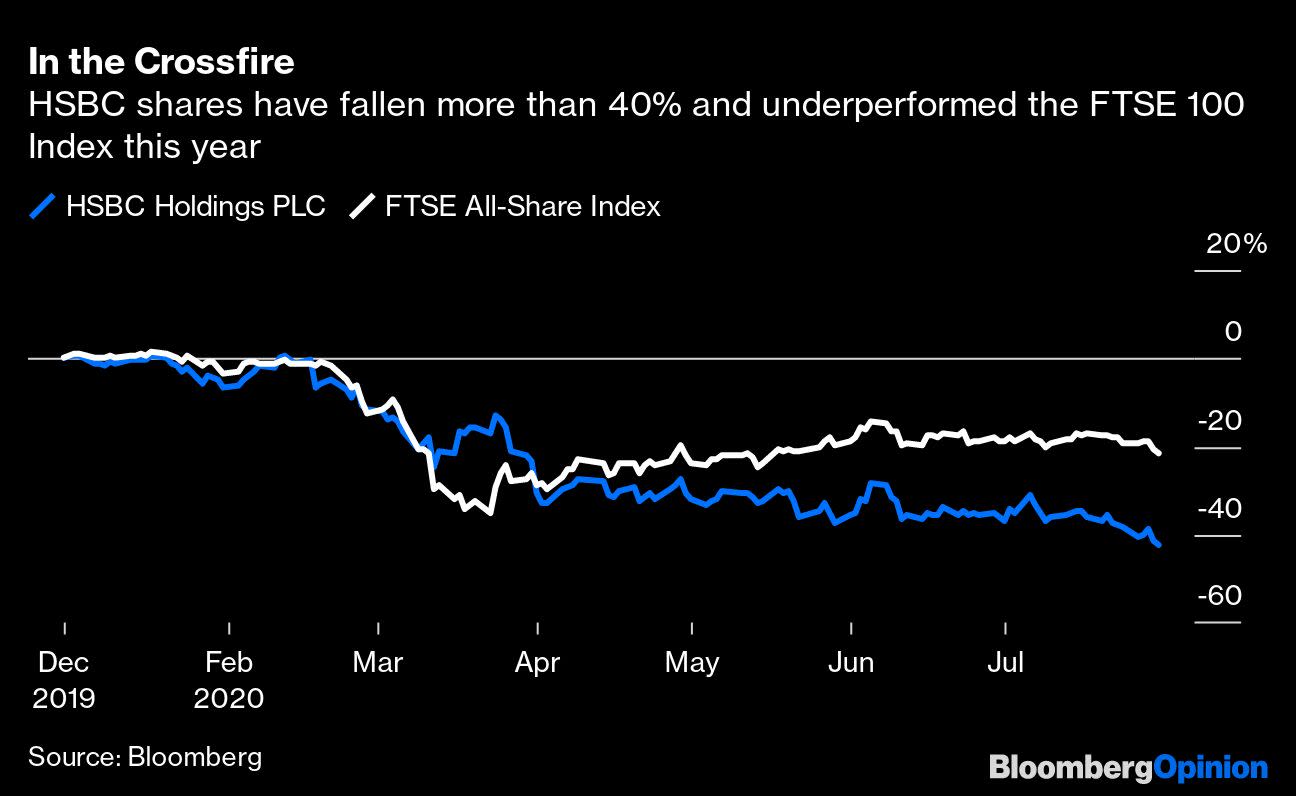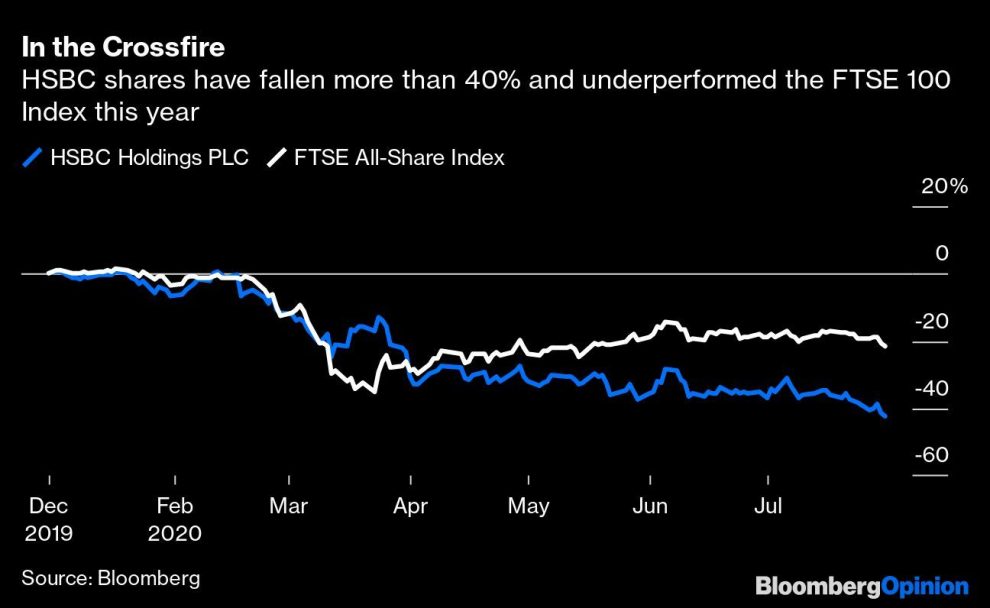
(Bloomberg Opinion) — HSBC Holdings Plc can’t seem to get a break. Even the financial-market boom that buoyed profits at some banks wasn’t enough to save Europe’s biggest lender from missing estimates. Chief Executive Officer Noel Quinn said HSBC is looking at accelerating restructuring plans that are expected to lead to the loss of 35,000 jobs. He may need to think even more radically.
The bank reported second-quarter adjusted pretax profit fell 57% from a year earlier to $2.59 billion, versus an estimate of $2.94 billion. HSBC lifted its projection for loan losses to between $8 billion and $13 billion for this year, as it contends with the economic impact of the Covid pandemic. The shares fell as much as 4.7% in Hong Kong trading, reaching their lowest since the depths of the global financial crisis in 2009.
Shrinking its workforce can’t fix the geopolitical headwinds the bank is facing. Headquartered in London but focused on Asia, HSBC is trapped between the demands of the U.K. and U.S. on one side and China on the other. With relations deteriorating and little prospect of an improvement, it may be time for the bank to consider separating its Asian business from the rest.
HSBC appears to have few allies in government. British lawmakers criticized the bank for showing support for China’s national security legislation in Hong Kong, while U.S. Secretary of State Michael Pompeo attacked what he called “corporate kowtows.” At the same time, toeing China’s line appears to have won HSBC scant reward in Beijing. The Communist Party’s People’s Daily newspaper published an opinion piece last week saying the bank was an accomplice of the U.S. in the arrest of Huawei Technologies Co. Chief Financial Officer Meng Wanzhou and fabricated evidence against the company. HSBC has denied the allegations.
The attacks have helped to drive the slump in HSBC’s Hong Kong-traded shares this year. They have lost 45%, far exceeding the 13% decline in the city’s benchmark Hang Seng Index.
HSBC’S London and Hong Kong listings serve largely different investor bases. That alone might argue for some form of separation. As Bloomberg Intelligence analyst Jonathan Tyce says, the bank could look into withdrawing from one of the markets. “We suspect that, as with many U.S. global tech companies, HSBC may choose to wait and see if a change in the U.S. presidency in November will ease this threat, but longer term, dual-listing will probably be reassessed,” he said.
A more fundamental shift would be to spin off the non-Asian business, creating two companies with separate management teams and perhaps listings. That might give HSBC a better chance of satisfying government and legal expectations in different parts of the world. At present, the bank faces being caught between conflicting demands of the national security law and potential U.S. sanctions against Chinese officials involved in imposing the legislation on Hong Kong.
There is a precedent. In early 2017, McDonald’s Corp. sold most of its Hong Kong and China business to a tie-up between state-owned Citic Ltd. and U.S. private equity firm Carlyle Group LP. Yum! Brands Inc., meanwhile, owner of the KFC and Pizza Hut brands, spun off Yum China for a separate listing in November 2016.
These changes appear to have insulated the companies against anti-American sentiment fueled by worsening trade tensions between China and the U.S. Yum China has outperformed its former parent since the spinoff. The prospect of Microsoft Corp. buying TikTok’s U.S. operations shows how the world is growing accustomed to the idea of sensitive businesses being carved into separate spheres of influence with different owners.
A side-benefit of splitting the Asian business might be to shift its domicile back to Hong Kong. That would enable the more-profitable regional unit to resume dividend payments, which HSBC was forced to cancel earlier this year at the behest of U.K. regulators. That decision angered HSBC’s legion of small shareholders in Hong Kong and has contributed to the stock’s underperformance this year.
Such a restructuring might face considerable regulatory hurdles. Quinn called the last few months the most challenging in living memory. Without radical change, HSBC may remain stuck between a rock and a hard place.
This column does not necessarily reflect the opinion of the editorial board or Bloomberg LP and its owners.
Nisha Gopalan is a Bloomberg Opinion columnist covering deals and banking. She previously worked for the Wall Street Journal and Dow Jones as an editor and a reporter.
<p class="canvas-atom canvas-text Mb(1.0em) Mb(0)–sm Mt(0.8em)–sm" type="text" content="For more articles like this, please visit us at bloomberg.com/opinion” data-reactid=”59″>For more articles like this, please visit us at bloomberg.com/opinion
<p class="canvas-atom canvas-text Mb(1.0em) Mb(0)–sm Mt(0.8em)–sm" type="text" content="Subscribe now to stay ahead with the most trusted business news source.” data-reactid=”60″>Subscribe now to stay ahead with the most trusted business news source.
©2020 Bloomberg L.P.











Add Comment